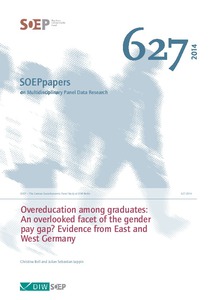Overeducation among graduates - an overlooked facet of the gender pay gap? Evidence from East and West Germany
"Germany’s occupational and sectoral change towards a knowledge-based economy calls for high returns to education. Nevertheless, female graduates are paid much less than their male counterparts. We wonder whether overeducation affects sexes differently and whether this might answer for part of...
| Main Authors: | , |
|---|---|
| Institution: | ETUI-European Trade Union Institute |
| Format: | TEXT |
| Language: | English |
| Published: |
Berlin
2014
DIW |
| Subjects: | |
| Online Access: | https://www.labourline.org/KENTIKA-19110493124919386759-overeducation-among-graduates-.htm |
| Summary: | "Germany’s occupational and sectoral change towards a knowledge-based economy calls for high returns to education. Nevertheless, female graduates are paid much less than their male counterparts. We wonder whether overeducation affects sexes differently and whether this might answer for part of the gender pay gap. We decompose total year of schooling in years of over- (O), required (R), and undereducation (U). As ORU earnings estimations based on German SOEP cross-section and panel data indicate, overeducation pays off less than required education in the current job even when unobserved heterogeneity is taken into account. Moreover, analyses of job satisfaction and self-assessed overeducation point to some real mismatch. However, overeducation does not matter for the gender pay gap. By contrast, women’s fewer years of required education reasonably do, answering for 7.61 pp. of the East German (18.79 %) and 2.22 pp. of the West German (32.98 %) approximate gap. Moreover, job biography and the household context affect the gap more seriously in the old Bundesländer than in the new ones. Overall, the West German pay gap almost doubles the East German one, and different endowments answer for roughly three quarters of the approximate gap in the Western but only for two thirds in the Eastern part. We conclude that the gendered earnings gap among German graduates is rather shaped by an employment behaviour suiting traditional gender roles and assigned gender stereotypes than being subject to gendered educational inadequacy." |
|---|---|
| Physical Description: | 42 p. Digital |

